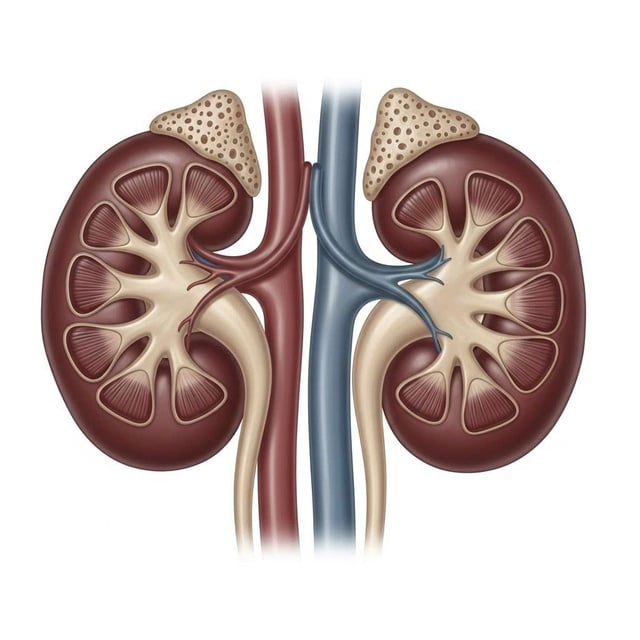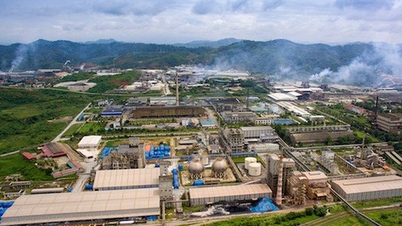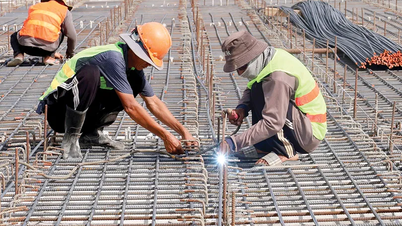Kidney failure progresses through five stages, from very mild (stage 1) to complete kidney failure (stage 5), and may not cause symptoms in the early stages. Symptoms and complications increase as the stages progress, according to the health news site Healthline .

Kidney failure progresses through 5 stages
Illustration: AI
Symptoms of complete kidney failure
Early-stage kidney disease often causes no noticeable symptoms. According to the US Centers for Disease Control and Prevention (CDC), about 90% of people with chronic kidney disease do not know they have the disease.
However, as the disease progresses to its final stages, more symptoms become apparent, including:
As kidney disease progresses, symptoms may include difficulty sleeping, accompanied by muscle cramps at night. The person may also feel excessively sleepy or tired during the day.
In addition, the patient also has other symptoms, including: Less urine output, swelling of the legs, ankles and feet due to water retention, difficulty breathing, persistent nausea, confusion, chest pain or tightness, seizures, coma.
Early signs of kidney failure
Symptoms of early-stage kidney disease can be subtle and difficult to recognize and may include: Decreased urine output, swelling of the limbs.
In particular, urine color does not tell much about kidney function until kidney damage is advanced.

As kidney disease progresses, symptoms may include: Difficulty sleeping, accompanied by muscle cramps at night
Illustration: AI
Causes that can lead to kidney failure
Kidney failure can be caused by a variety of factors. According to the National Kidney Foundation, the two most common causes are high blood pressure and diabetes.
People at highest risk often have one or more of the following conditions:
Loss of blood flow to the kidneys. A sudden loss of blood flow to the kidneys can lead to kidney failure. Some causes include: heart attack, heart disease, liver scarring or liver failure, dehydration, severe burns, allergic reactions, severe infections such as sepsis. High blood pressure and anti-inflammatory drugs can also restrict blood flow.
Problems with urination. When the body cannot excrete urine, toxins build up and overload the kidneys. Certain cancers can block the urinary tract, including: prostate, colon, cervix, and bladder.
Other conditions that can interfere with urination include: kidney stones, enlarged prostate, blood clots in the urinary tract, and bladder nerve damage.
What age is most susceptible to kidney failure?
People of all ages can develop kidney failure, but the risk increases with age. According to the CDC, about one-third of people over 65 have kidney failure — nearly three times more than those aged 45 to 64, according to Healthline .
Source: https://thanhnien.vn/kho-ngu-dai-dang-coi-chung-dau-hieu-am-tham-cua-suy-than-185250710174102463.htm


































![[Photo] Parade to celebrate the 50th anniversary of Laos' National Day](/_next/image?url=https%3A%2F%2Fvphoto.vietnam.vn%2Fthumb%2F1200x675%2Fvietnam%2Fresource%2FIMAGE%2F2025%2F12%2F02%2F1764691918289_ndo_br_0-jpg.webp&w=3840&q=75)






















![[VIMC 40 days of lightning speed] Hai Phong Port determined to break through, reaching the target of 2 million TEUs by 2025](https://vphoto.vietnam.vn/thumb/402x226/vietnam/resource/IMAGE/2025/12/04/1764816441820_chp_4-12-25.jpeg)




















































Comment (0)